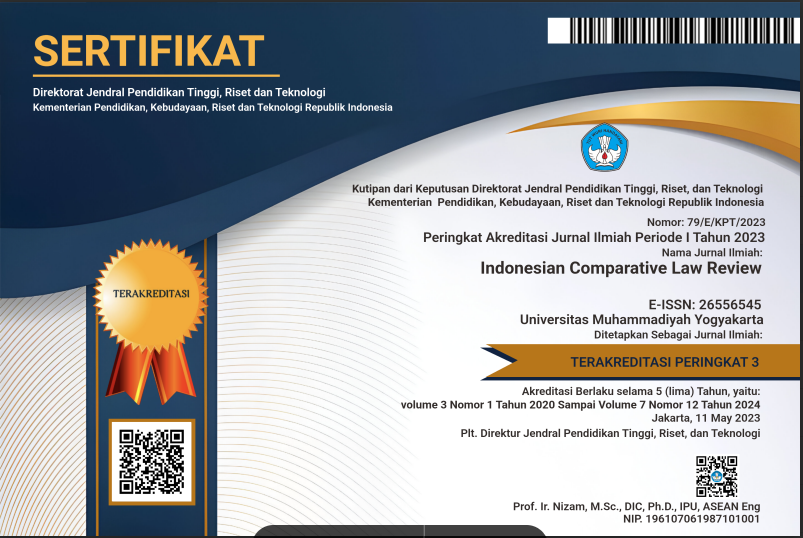Consolidating Indonesia’s Fragile Elections Through E-Voting: Lessons Learned from India and the Philippines
Abstract
Keywords
Full Text:
PDFReferences
Ghofar, A. (2018). Dispute on Presidential
Threshold: Decisions of the
Constitutional Court and Other
Countries' Experiences. Jurnal
Konstitusi, 13(3)
Ramadhan, A.P., et. al. (2018). Electronic
Voting in Indonesia: Head of Village
Election. Jurnal Sospol, 4(2)
Trihartono, A. & Patriadi, H.B. (2015). The
Indonesian General Election and
Beyond: Melting 'Frozen' Cleavages.
Asian Journal of Comparative Politics,
(1)
Tsahkna, A-G. (2013). E-Voting Lessons from
Estonia, European View, 12
Birch, S. (2011). Electoral Malpractice. Oxford:
Oxford University Press
Avregou, C., et al. (2019). Trusting E-Voting
Amid Experiences of Electoral
Malpractice. Journal of Information
Technology, 34(3)
Dagg, C.J. (2007). The 2004 Elections in
Indonesia: Political Reform and
Democratisation. Asia Pacific
Viewpoint, 48(1)
Holmes, D. & Sulistyanto. (2016).
Understanding the Indonesian
Mediapolis: The Role of Social Media During the 2014 Indonesian
Presidential Election. Communication,
Politics & Culture, 49(2)
Suryani, D. (2015). Defending Democracy:
Citizen Participation in Election
Monitoring in Post-Authoritarian
Indonesia. Journal of Government and
Politics, 6(1)
Lee, D-Y. & Chung, S.H. (2004). Democratic
Consolidation and Electoral Reform in
Southeast Asia: Philippines, Thailand,
and Indonesia. Global Economic Review,
(4)
Aspinall, E & Mietzner, M. (2014). Indonesian
Politics in 2014: Democracy's Close
Call. Bulletin of Indonesian Economic
Studies, 50(3)
Cahyono, H. (2004). Pelanggaran Pemilu
Legislatif 2004. Jurnal Penelitian Politik,
(1)
Ismanto, I. & Legowo, T.A. (2005). Pemilihan
Presiden Secara Langsung 2004. Jakarta:
Kedeputian Dinamika Masyarakat
Menristek
Darmawan, I. & Nurhandjati, N. (2016).
Electronic Voting in Indonesia: Head
of Village Election. Jurnal Politik, 1(2)
Wanandi, J. (2004). The Indonesian General
Elections 2004. Asia-Pacific Review,
(2), p 115-116.
Masataka, K. (2015). Information and
Communication Technology and
Election Administration in the
Philippines. Philippines Political Science
Journal, 36(1)
Hardjaloka, L. & Simarmata, V.M. (2011). E-
Voting: Kebutuhan vs. Kesiapan
(Menyongsong) E-Demokrasi. Jurnal
Konstitusi, 8(4)
Anistiawati, M.L. (2014). Implementasi
Kebijakan Penerapan Elektronik
Voting (E-Voting) Dalam Pemilihan
Kepala Desa. Jurnal Citizen Charter,
(2)
Prandini, M & Ramili, M. (2012). A Model for
E-voting Systems Evaluation Based on
International Standards: Definition
and Experimental Validation. e-Service
Journal, 8(3)
Alomari, M.K. (2016). E-Voting Adoption in a
Developing Country. Transforming
Government: People, Process and Policy,
(4)
Norris, P. (2014). Why Electoral Integrity
Matters. Cambridge: Cambridge
University Press
Norris, P. (2013). The New Research Agenda
Studying Electoral Integrity. Electoral
Studies, 32(4)
Levitsky, S & Ziblatt, D. (2018). How
Democracies Die. New York: Crown
Lauer, T.W. (2004). The Risk of e-Voting.
Electronic Journal of e-Government, 2(3)
Apriani, T., et. al. (2018). E-voting in the
Village Head Election in Batanghari
and Kabupaten Bogor Regencies.
Jurnal Bina Praja, 10(2)
Boudreau, V. (2009). Elections, Repression
and Authoritarian Survival in Post-
Transition Indonesia and the
Philippines. The Pacific Review, 22(2)
Legislations
Constitution of the Republic of
Indonesia
Law Number 7 of 2017 on General Election
Law Number 34 of 2004 on Indonesia
National Army
Law Number 23 of 2003 on General Election
for President and Vice-President
Law Number 2 of 2002 on Indonesia National
Police
Constitutional Court Decision Number
/PHPU.PRES-XIII/2014
Constitutional Court Decision Number
/PUU-VII/2009
Constitutional Court Decision Number 108-
/PHPU.B-VII/2009
Constitutional Court Decision Number
/PHPU/BII/2004
Internets
Anwar Siswadi. (2019). Saat Orang Kota
Nyoblos Pakai Paku, 981 Desa Sudah e-
Voting. Tempo.co, retrieved from
https://tekno.tempo.co/read/120278
/saat-orang-kota-nyoblos-pakai-
paku-981-desa-sudah-e-
voting/full&view=ok
BBC Reality Check Team. (2019). Indonesia
Election 2019: Why Did So Many
Officials Die? BBC, retrieved from
https://www.bbc.com/news/world-
asia-48281522
Dina Manafe and Nur Yasmin. (2019). What
Kills Indonesian Election Officials?
Jakarta Globe, retrieved from
https://jakartaglobe.id/news/what-
kills-indonesian-election-officials/
Sausan Atika. (2019). Anies in Tough Spot in
Wake of Jakarta Riot. The Jakarta Post,
retrieved from
https://www.thejakartapost.com/ne
ws/2019/05/24/anies-tough-spot-
wake-jakarta-riot.html
Miscellaneous
Ufen, A. (2008). The Evolution of Cleavages in
the Indonesian Party System. Hamburg:
German Institute for Global and Area
Studies
Ellis, A., et. al. (2007). Voting from Abroad: The
International IDEA Handbook, Mexico:
Federal Electoral Institute of Mexico
Bland, B. (2019). Politics in Indonesia: Resilient
Elections, Defective Democracy, Lowy
Institute, retrieved from
https://www.lowyinstitute.org/publi
cations/politics-indonesia-resilient-
elections-defective-democracy
Zafar, C.N. & Pilkjaer, A. (2007). E-Voting in
Pakistan, Master Degree Thesis, Lulea:
Department of Business
Administration and Social Sciences of
Lulea University of Technology
Mietzner, M. (2009). Indonesia's 2009 Elections:
Populism, Dynasties and the
Consolidation of the Party System,
Sydney: Lowy Institute for
International Policy
DOI: https://doi.org/10.18196/iclr.v3i1.11298
Refbacks
- There are currently no refbacks.
Copyright (c) 2021 Tareq Muhammad Aziz Elven, Shalahuddin Ahmad Al-Muqorrobin

This work is licensed under a Creative Commons Attribution 4.0 International License. View My Stats


